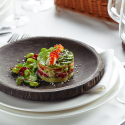5 Must-Try Exotic Fruits and Their Health Benefits
 Exploring exotic fruits can be a delightful way to diversify your diet. Let's delve into their unique advantages.
Exploring exotic fruits can be a delightful way to diversify your diet. Let's delve into their unique advantages.Mango: Nutritional Powerhouse
Mangoes are celebrated for their high fiber content, essential for a healthy gut microbiome. While they contain sugars, the presence of complex carbohydrates ensures a slower absorption rate. Rich in B vitamins, vitamin C, beta-carotene, vitamin E, and mangiferin, mangoes enhance lipid profiles, reduce free radicals, and curb chronic inflammation. Vitamin C fortifies blood vessels and speeds up recovery, while vitamin B6 aids in collagen production, improving hair structure. Vitamin A promotes youthful skin, and mangoes can alleviate nausea and heartburn during pregnancy.
Cautions: Diabetics should moderate their intake due to the fruit's sugar content (around 14.8g per medium mango). People with gastrointestinal issues might experience discomfort due to its fiber and sugar combination. Unripe mangoes can irritate the stomach lining, and excessive consumption may lead to fever or constipation. Mangoes may trigger allergies, particularly for those sensitive to cashews or pistachios due to the presence of urushiol.
Cosmetic Uses: Mango masks and oils are popular for their anti-inflammatory, soothing, and regenerating properties. Mango oil hydrates and protects the skin from UV rays, making it ideal for problematic skin. It reduces facial puffiness and smooths fine lines, also helping to combat stretch marks by improving lymph flow and circulation.
Recipe Idea - Mango Mousse:
Ingredients: 1 mango, 1/2 cup water, 1 packet gelatin, 2 eggs.
Preparation: Blend mango chunks with water until smooth. Dissolve gelatin in water, add to mango mixture. Whip egg whites until foamy, fold into mango mix. Chill for eight hours.
Pomegranate: Nutrient-Rich and Versatile
Known as the "granular apple" in ancient Rome, pomegranates are a rich source of iron, vitamin C, and B vitamins. They offer anti-inflammatory and anti-cancer properties, benefiting cardiovascular, urinary, and endocrine systems. Vitamins C, P, B6, and B12 enhance immunity and nervous system health. Pomegranate juice, rich in potassium, magnesium, and copper, supports protein metabolism and iron absorption, crucial for heart health.
Cautions: High sugar content (about 14g per 100g) necessitates caution for diabetics and those with obesity. Pomegranate seeds, while probiotic-rich, can cause digestive issues if overconsumed. Its astringent properties may aggravate chronic constipation. The antioxidant punicalagin in pomegranate juice and peel exceeds that of green tea and red wine, reducing oxidative stress and systemic inflammation.
Cosmetic Uses: Pomegranate peel is used in whitening cosmetics, and its components are found in creams, toners, and masks for dry and inflamed skin. Organic acids cleanse dead skin cells, while vitamins and minerals nourish deeply. Pomegranate acid promotes collagen production, essential for skin elasticity and reducing existing collagen fiber degradation.
Recipe Idea - Pomegranate Jam:
Ingredients: 1 cup pomegranate seeds, 3 cups pomegranate juice, 3 cups sugar, 1 tbsp lemon juice.
Preparation: Mix juice and sugar, simmer for 30 minutes. Cool and repeat twice. Add seeds and lemon juice, cook until thick. Jar and seal.
Dragon Fruit: Low-Calorie Delight
Dragon fruit, with its delicate jasmine or watermelon-like aroma, is a low-calorie option rich in fiber and antioxidants like polyphenols, lycopenes, and betacyanins. These compounds neutralize free radicals and reduce chronic inflammation. The fruit also contains magnesium, iron, and vitamins C and E, benefiting the heart, bones, and nervous system while maintaining stable blood sugar levels.
Cautions: Suitable for most diets due to its low calorie (40 kcal per 100g) and carbohydrate content (13.5g per 100g). However, excessive consumption can lead to allergic reactions. Pregnant and breastfeeding women should avoid it, and it's best introduced to children after age three.
Cosmetic Uses: High in vitamin C, dragon fruit fights acne and redness. Vitamin E and beta-carotene prevent premature aging, and proteins and folic acid rejuvenate the skin, giving it a fresh glow.
Recipe Idea - Dragon Fruit Smoothie:
Ingredients: 1 banana, 1/2 mango, 1 dragon fruit, 200 ml apple juice.
Preparation: Blend all fruits with apple juice until smooth.
Passion Fruit: Stress Reliever
Passion fruit, also known as granadilla, is a popular Thai fruit. Both its seeds and pulp are nutritious, packed with vitamin A (beta-carotene), vitamin C, fat-soluble vitamins, and vitamins E and K. It’s cholesterol-free, rich in organic acids, vitamins, and fiber, acting as a natural antioxidant to slow aging, lower cardiovascular disease risk, and boost immunity. Beta-carotene supports skin, hair, and nail health, while the fruit’s sedative properties help manage stress.
Cautions: Its mild sedative effect means it should be consumed cautiously by those needing high concentration or by drivers. Not recommended for children or pregnant women due to its high allergenicity.
Cosmetic Uses: The fruit's pulp tightens pores, evens skin tone, reduces fine lines, and lessens hair loss. Vitamins and minerals rejuvenate and nourish the epidermis, and fatty acid-rich oils in the fruit’s extracts restore skin’s lipid balance, combat oily shine and puffiness, and promote healing.
Recipe Idea - Passion Fruit Lemonade:
Ingredients: 150g cucumber, 12 ice cubes, 250ml sparkling mineral water, 100g passion fruit pulp, 30ml lemon juice.
Preparation: Blend cucumber with lemon juice, add passion fruit pulp, mix with sparkling water and ice cubes.
Pineapple: Digestive Aid
Pineapple contains bromelain, an enzyme that accelerates digestion, alleviating discomfort and heaviness in the stomach, and preventing gas and bloating.
Cautions: Avoid pineapple when taking blood-thinning medications as it may enhance their effects, increasing bleeding risks. Pregnant women should consume it moderately (no more than 150g daily) due to its potential to increase uterine tone. Those with sensitive teeth should also limit their intake due to its high acidity.
Cosmetic Uses: Pineapple's alpha hydroxy acids in skincare products help exfoliate and whiten skin, providing anti-cellulite, anti-inflammatory, and anti-edema benefits. Its antioxidants rejuvenate skin and promote collagen production.
Recipe Idea - Pineapple Chicken:
Ingredients: 300-400g chicken breast, 150g pineapple, 3 tomatoes, 1-2 tsp curry, 1 tsp ground ginger, onion, garlic, salt.
Preparation: Dice chicken, pineapple, tomatoes; sauté onion and garlic in ghee, add tomatoes, curry, ginger, and pineapple. Add chicken, 1/4 cup water, simmer for 7-10 minutes.
By incorporating these exotic fruits into your diet, you can enjoy diverse flavors while reaping numerous health and skincare benefits.









